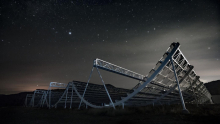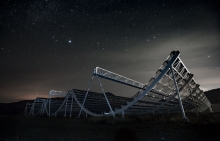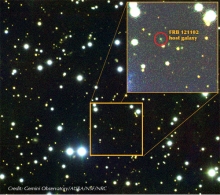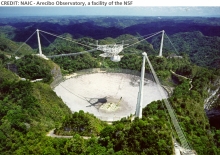Fleeting blasts of energy from space, known as fast radio bursts (FRBs), are a cosmic enigma. A Canadian-led international team of researchers has published new findings suggesting that supernovae are the predominant contributors to forming sources that eventually produce FRBs.


Astronomers from McGill University are part of an international team that has discovered 25 new sources of repeating fast radio bursts (FRBs), these explosions in the sky that come from far beyond the Milky Way. This discovery brings the total number of confirmed FRB sources to 50.

In the quest to identify the origins of one of astronomy’s biggest mysteries – fast radio bursts (FRBs) – Canada’s world-renowned telescope, the Canadian Hydrogen Intensity Mapping Experiment (CHIME), is getting backup.

McGill University scientists have developed a new system for sharing the enormous amount of data being generated by the CHIME radio telescope in its search for fast radio bursts (FRBs), the puzzling extragalactic phenomenon that is one of the hottest topics in modern-day astronomy.

Fast radio bursts, or FRBs, blaze for a few milliseconds before vanishing without a trace. Their origins are unknown, and their appearance is unpredictable. In the decade following their discovery in 2007, only 140 FRBs had been seen. Now, thanks to the launch of a large stationary telescope in the interior of British Columbia in 2018, the number of new FRBs detected has almost quadrupled – for a total of 535.

Since fast radio bursts (FRBs) were first discovered over a decade ago, scientists have puzzled over what could be generating these intense flashes of radio waves from outside of our galaxy. In a gradual process of elimination, the field of possible explanations has narrowed as new pieces of information are gathered about FRBs – how long they last, the frequencies of the radio waves detected, and so on.

A Canadian effort to build one of the most innovative radio telescopes in the world will open the universe to a new dimension of scientific study. The Honourable Kirsty Duncan, Minister of Science, today installed the final piece of this new radio telescope, which will act as a time machine allowing scientists to create a three-dimensional map of the universe extending deep into space and time.

Astronomers have pinpointed for the first time the home galaxy of a Fast Radio Burst, moving scientists a step closer to detecting what causes these powerful but fleeting pulses of radio waves. FRBs, which last just a few thousandths of a second, have puzzled astrophysicists since their discovery a decade ago.

By Chris Chipello, McGill Newsroom
Astronomers for the first time detect repeat ‘fast radio bursts’ from same sky location
Astronomers for the first time have detected repeating short bursts of radio waves from an enigmatic source that is likely located well beyond the edge of our Milky Way galaxy. The findings indicate that these “fast radio bursts” come from an extremely powerful object which occasionally produces multiple bursts in under a minute.

By Chris Chipello, McGill Newsroom
McGill researchers Elena Bennett and Yasser Gidi also honoured by NSERC
The Natural Sciences and Engineering Research Council of Canada (NSERC) has named McGill University astrophysicist Vicky Kaspi as this year’s recipient of the Gerhard Herzberg Canada Gold Medal for Science and Engineering, NSERC’s highest honour, in recognition of the excellence and influence of her research contributions.
